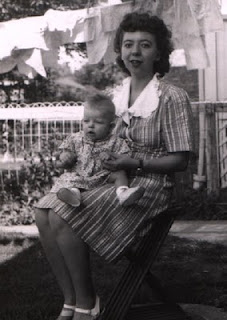 |
| Alyce Freeberg |
Often I'm asked how I got started preserving the stories of America's World War 2 veterans. Like some of the veterans I've interviewed, I have a standard response. However, while listening recently to a 1995 interview with Hilding and Alyce Freeberg, I discovered something a bit more candid and off the cuff.
Alyce Freeberg: This is wonderful (my book "Tanks for the Memories"). I'm very moved by all of this.
Aaron Elson: I think that, I started this, actually I got this little tape recorder when my dad was in the hospital, this very one. I said "I'm gonna go sit down with him and make him tell me his war stories."
Alyce Freeberg: Good.
Aaron Elson: I didn't. I left it home. I went to visit him in the hospital, and then he got out of the hospital, he didn't follow his diet, and then two weeks later he had a heart attack and passed away. But the tape recorder was in a drawer, and I took it with me, I got the newsletter, it was sent to him like five years after he passed away he was still getting it, and I found one and I wrote to Ray Griffin, and he wrote back and said why don't you come to a reunion, so I did. That's when I started doing this, I had the tape recorder, I found three people who remembered my dad. But at the same time, I couldn't believe the stories that I was hearing. And like Andy Schifler said, and this is something I've heard so many times, that they never tell these things to their kids.
Alyce Freeberg: No. He (Hilding) doesn't, either.
Hilding Freeberg: And the only reason my daughter has the stuff is because she was here a month ago or so, and we got talking about the Army, oh I know, what I heard on the radio, on TV, they said that all the people, all the Army personnel that were involved in D-Day are heroes, so I told her, hey, I'm a hero. I think it's D-Day 10, or 6, I don't remember, but I'm a hero, being I was there.
Alyce Freeberg: Yeah. And that's how she wanted them. She's one of those really interested people, you know.
Hilding Freeberg: So she took it all. Then I had a book of, one of the infantry...
Aaron Elson: The 90th Infantry?
Hilding Freeberg: Well, it wasn't the 90th, the book I had on, but it showed all around where we went also. So she took that. We were attached to the 90th, but I don't have nothing about the 90th, not a thing.
Aaron Elson: But that's one thing that a lot of fellows who were there just don't...
Hilding Freeberg: No, they don't say nothing at all.
Aaron Elson: Even Forrest Dixon said, he's got three grown children, and he's very active, goes to all the reunions, he said one day he was talking with somebody and the other person referred to him as Major, and he said his son said, "Gee, Dad, I never knew you were a major."
Alyce Freeberg: He never mentioned that he was a major.
Aaron Elson: So that's why I started doing this, taking the tape recorder and putting some of this stuff down. Because I think in 25 years it will be good to have as complete as possible a look at one unit. I don't think anybody is doing anything like that from this perspective.
Hilding Freeberg: No, they're not.
No comments:
Post a Comment